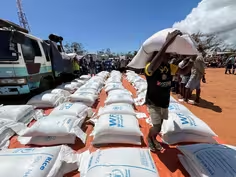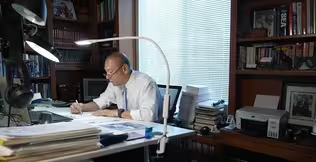
Brooks and Capehart on Trump's reaction to public pressure
Clip: 4/25/2025 | 9m 31sVideo has Closed Captions
Brooks and Capehart on Trump's reaction to public pressure
New York Times columnist David Brooks and Washington Post associate editor Jonathan Capehart join Amna Nawaz to discuss the week in politics, including the Trump administration walking back decisions on trade and student visas amid public pressure, the FBI arresting a judge in Wisconsin and dysfunction at the Pentagon.
Problems playing video? | Closed Captioning Feedback
Problems playing video? | Closed Captioning Feedback
Major corporate funding for the PBS News Hour is provided by BDO, BNSF, Consumer Cellular, American Cruise Lines, and Raymond James. Funding for the PBS NewsHour Weekend is provided by...

Brooks and Capehart on Trump's reaction to public pressure
Clip: 4/25/2025 | 9m 31sVideo has Closed Captions
New York Times columnist David Brooks and Washington Post associate editor Jonathan Capehart join Amna Nawaz to discuss the week in politics, including the Trump administration walking back decisions on trade and student visas amid public pressure, the FBI arresting a judge in Wisconsin and dysfunction at the Pentagon.
Problems playing video? | Closed Captioning Feedback
How to Watch PBS News Hour
PBS News Hour is available to stream on pbs.org and the free PBS App, available on iPhone, Apple TV, Android TV, Android smartphones, Amazon Fire TV, Amazon Fire Tablet, Roku, Samsung Smart TV, and Vizio.
Providing Support for PBS.org
Learn Moreabout PBS online sponsorshipAMNA NAWAZ: From dysfunction at the Department of Defense to a judge in Wisconsin being arrested by the FBI, it's shaped up to be quite the week.
Luckily, here to break it all down, I'm joined by Brooks and Capehart.
That is New York Times columnist David Brooks and Jonathan Capehart, associate editor for The Washington Post.
It's great to see you both.
So, David, I want to start off with you because in the last -- for almost 100 days now into his presidency, just in this last week, we saw a bit of a reversal or a walk-back from President Trump on a couple of stances.
One was a sort of softening on the rhetoric towards China and the trade war, and the other, as Laura reported earlier, the administration abruptly reversing itself on the potential cancellation of thousands of foreign student visas.
I don't mean to connect these two in any way.
They are not connected, but they did happen this week.
And I just wonder, as you reflect on where they are now, what this says to you about how the administration is processing feedback and who they're listening to.
It suggests, well, as we learned in Trump one, they don't have a long-term strategy.
There's no policy process, we're going to do this, and then we're going to stick through it no matter who says what.
They just don't do that.
Trump is instinctive.
He responds to the moment.
And the lesson for people who want to defend institutions, whether you're a university, whether you're a law firm, whether you're a scientific research center, whether you're a business who doesn't like what tariffs are doing to your business, is that you can throw sand in the gears of this administration, and they will respond.
They're going to do what they want to do.
But people who oppose what they want to do and want to defend American institutions can do lawsuits, they can do lobbying, there can be leaking, there can be protests.
There are all these things that can happen and they have proven this week they will have an effect.
Donald Trump listened to, like, the CEO of Walmart.
He listens to the polls.
He listens when there's all these lawsuits.
He listened to something about the student -- the international students.
Now, that doesn't say things are going back to normal.
The tariffs are still higher.
If you're a university, your international students are still in jeopardy.
But it shows what can be done, that there is possibility for an opposition to Trump to have successes if they can apply just relentless pressure.
AMNA NAWAZ: Jonathan, what do you make of that?
You take away the same lessons?
JONATHAN CAPEHART: Yes, I do.
David had a great column today in The New York Times where he talked about what the opposition should do in the face of an administration that hit the ground running.
And the whole point of this administration has been to flood the zone, confuse everybody, confound everybody, and get as much done and through the gates as possible before the opposition has a chance to recover.
And right now what we have been seeing is not just the opposition recovering, but the American people deciding that they don't exactly like what they see.
A raft of polls has started coming out in anticipation of the president's first 100 days.
And on the economy and on immigration, the two issues he ran on or said he was going to run on and change things immediately, he is now underwater and at least two polls that come to mind, but we're going to see more, if not later today, than over the weekend showing that the president is losing ground on the two issues he campaigned on.
AMNA NAWAZ: Meanwhile, David, as Laura also reported earlier, this is other story we're tracking, which seems to mark a different chapter in the ongoing immigration agenda of this administration.
That was the FBI arresting and charging a sitting judge in Milwaukee.
Now, the FBI says that she obstructed their agents when they were trying to arrest an undocumented immigrant who was in her courthouse.
It's been reported, she allowed him to leave through a side door.
But what does this say to you now in terms of what the administration is willing to do and how this was carried out?
DAVID BROOKS: Well, obviously, they're trying to send a note of intimidation, not only to her, but to all judges and maybe to all Americans.
But I don't yet know the specific details of this case, whether she escorted the guy out the jury door or whether she led him.
So that's all murky.
I don't want to comment on this specific case.
But especially on the issue of immigration, there are a lot of people who are appalled by what the administration is doing.
And there will be times for civil disobedience.
And, to me, if she -- let's say she did escort this guy out the door.
If federal enforcement agencies come to your courtroom and you help a guy escape, that is two things.
One, it strikes me as maybe something illegal, but it also strikes me as something heroic.
And in times of trouble, then people are sometimes called to do civil disobedience.
And in my view, when people do civil disobedience, they have to pay the price.
That's part of the heroism of it, frankly.
And so you can both think that she shouldn't have legally done this and that morally protecting somebody against, maybe not even in this case, but in other cases, frankly, a predatory enforcement agency, sometimes, civil disobedience is necessary.
And I don't know if we will get to this point, but we could get to this point in weeks or months where acts of civil disobedience on a lot of fronts may be necessary.
And the Trump administration will probably welcome that kind of fight, but their opponents should welcome that kind of fight.
And that's one of the ways you can shift public opinion, because one of the ways authoritarians lose control is when their opponents protest in a nonviolent way, and the authoritarians crack down violently.
That's the way you delegitimize an authoritarian regime.
And so that -- it may come to that.
AMNA NAWAZ: Jonathan, what do you make of that on both fronts here, both the accountability part of it and also the message being sent?
JONATHAN CAPEHART: Well, certainly the message being sent is intimidation.
And it is part of an ongoing activity by the president to intimidate the judiciary from openly defying lawful orders of courts not to do X, Y, or Z to what we just saw in that courtroom in Wisconsin.
I read the affidavit that was a probable cause to take action against the judge.
And this scene -- reading that affidavit, Amna and David, made me think of how the Trump administration is very good at muddying up the waters here.
So you now have a situation where a defendant who was in the courtroom because he was charged on three counts of battery, domestic abuse, infliction of physical pain or injury, and you read in the affidavit that the judge was told that ICE was there, she talked to them, and she said, you need to go talk to the chief judge.
And when they go and talk to the chief judge, he said, I got to come up with the policy here because we need to figure out how we're going to work this out, but did acknowledge that they are able to -- that they are able to do the arrest in public places.
All that to say is that the Trump administration is going to hang their hats on that.
And, meanwhile, as David says in that, and I agree, that you have a judge who is, it seems to me, taking a moral stand.
I look forward to hearing from that judge, because if she doesn't stand up against what's now happened to her, which is a ratcheting up of the intimidation against the judiciary, then no other judge is going to take that same stand.
And that is my big fear.
AMNA NAWAZ: Meanwhile, I have to ask you both about what we're seeing unfolding at the Department of Defense.
David, separate from what we're calling Signalgate, right, which is Secretary of Defense Hegseth's use of a commercial messaging app and sending sensitive information, there have been a number of stories questioning his leadership at the agency.
He's fired four top officials in just the last week.
We saw his top spokesman, John Ullyot, resign a few days ago.
And he wrote about the chaos inside, saying this: "Even strong backers of the secretary like me must admit the last month has been a full-blown meltdown at the Pentagon.
It's becoming a real problem for the administration."
Where is the line here in terms of why the president continues to stand by him and when he might not?
DAVID BROOKS: Ullyot wrote that piece in Politico and I thought it was the work of Tolstoy.
It was a work of genius.
It was like mind-boggling, that op-ed, because, basically, he said, I'm friends with Pete Hegseth.
I'm a long time supporter of Pete Hegseth.
I salute Pete Hegseth.
The guy's a total disaster.
(LAUGHTER) DAVID BROOKS: And I would tell Ullyot that, do you think your friendship with Pete Hegseth is going to last?
And he was saying like, I really value our friendship.
I wouldn't bet on that.
I think that relationship might be over.
But -- so, but the point is that Pete Hegseth has always been attacked by his friends, at FOX, at the veterans organizations he was part of.
It was the people he worked closest with and who claimed to be on his side that were always the critics.
So Pete Hegseth needs to be better at picking friends or better at running things.
AMNA NAWAZ: Jonathan, got less than a minute left.
What's your take?
JONATHAN CAPEHART: Look, Secretary Hegseth is in a job he is not qualified to be in, that he shouldn't have even been nominated to be in.
And now we are seeing the results of that.
Anybody who is using a public messaging system in one of the - - what's supposed to be one of the most secure places within the federal government, that tells you everything you need to know.
Donald Trump says he's with Pete Hegseth, until which time he is no longer with Pete Hegseth.
Loyalty with Donald Trump only runs one way.
AMNA NAWAZ: Jonathan Capehart, David Brooks, always great to talk to you both.
Thank you so much.
JONATHAN CAPEHART: Thanks, Amna.
DAVID BROOKS: Thank you.
FBI charges judge with obstructing immigration agents
Video has Closed Captions
Clip: 4/25/2025 | 6m 54s | Judge charged with obstructing immigration agents, escalating Trump's fight with judiciary (6m 54s)
'People are starving,' WFP says as Israel blocks aid to Gaza
Video has Closed Captions
Clip: 4/25/2025 | 7m 38s | 'Food is not political,' WFP head says as U.S. cuts aid and Israel blocks help to Gaza (7m 38s)
Political cartoonists navigate a changing media landscape
Video has Closed Captions
Clip: 4/25/2025 | 7m 55s | Political cartoonists on navigating a changing media landscape (7m 55s)
U.S. business leaders shifting plans because of tariffs
Video has Closed Captions
Clip: 4/25/2025 | 7m 24s | How U.S. business leaders are shifting plans amid tariffs and uncertainty (7m 24s)
Vatican prepares for potentially polarizing papal conclave
Video has Closed Captions
Clip: 4/25/2025 | 6m 44s | Vatican readies for Francis' funeral and potentially polarizing papal conclave (6m 44s)
Providing Support for PBS.org
Learn Moreabout PBS online sponsorship
- News and Public Affairs

FRONTLINE is investigative journalism that questions, explains and changes our world.

- News and Public Affairs

Amanpour and Company features conversations with leaders and decision makers.












Support for PBS provided by:
Major corporate funding for the PBS News Hour is provided by BDO, BNSF, Consumer Cellular, American Cruise Lines, and Raymond James. Funding for the PBS NewsHour Weekend is provided by...




